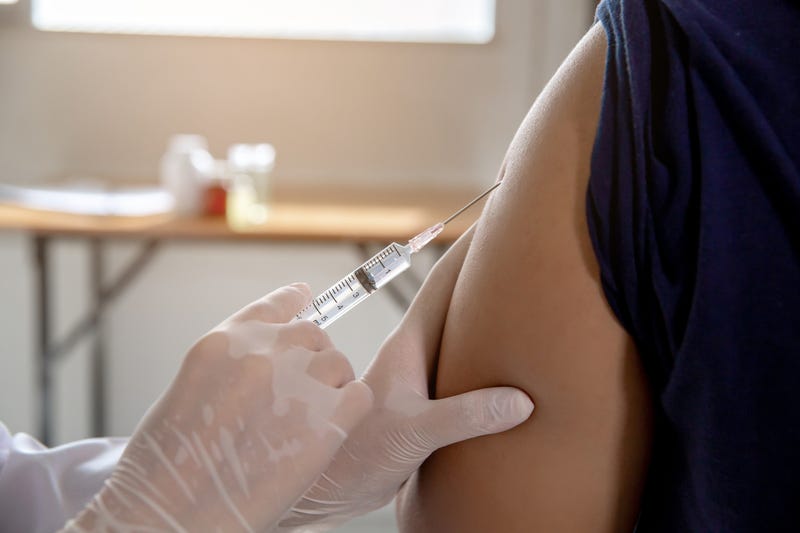
After she received a shot of AstraZeneca’s two-dose COVID-19 vaccine in November 2020, Brienne Dressen had blurred vision and her hearing became distorted. Her symptoms then became even worse.
Researchers are now looking into why some people, such as Dressen, experience “Long COVID” symptoms after getting a vaccine, according to the American Association for the Advancement of Science (AAAS). This research could help improve vaccines going forward.

“You have to be very careful” before tying COVID-19 vaccines to complications, said Avindra Nath, clinical director at the National Institute of Neurological Disorders and Stroke (NINDS), who worked with Dressen to study her symptoms. “You can make the wrong conclusion. … The implications are huge.”
Dressen, a Utah resident who did not contract COVID-19 prior to getting her shot, discovered her symptoms were similar to those of Long COVID while spending hours reading online posts. Long COVID is a chronic, long term, disabling condition that can occur after battling the virus. It effects an estimated 5 to 30 percent of people who become infected with SARS CoV-2.
“I felt like I had two seashells on my ears,” she said of her symptoms the day she got her shot. As time went on, Dressen's symptoms worsened to the point where she could not leave a darkened room or tolerate her young children’s touch. Dressen said symptoms included heart rate fluctuations, severe muscle weakness, and what she described as “debilitating internal electric shocks.”
Jana Ruhrländer, a microbiology graduate student in Kassel, Germany, also said she experienced the electric shock symptom after receiving a single shot of the two-dose Moderna vaccine. She also experienced partial facial paralysis, muscle weakness and intense thirst as well as heart rate and blood pressure changes.
Both Dressen and Ruhrländer’s symptoms were dismissed by their doctors, according to AAAS. A doctor diagnosed Dressen with anxiety and Ruhrländer’s doctor said tests found nothing wrong.
They both decided to dig deeper.
Dressen and her husband found others who experienced long-lasting symptoms after receiving a COVID-19 vaccine, regardless of the manufacturer. The AstraZeneca vaccine, which Dressen received, is not approved by the U.S. Food and Drug Administration, but it was approved for use in the U.K. The Moderna vaccine that Ruhrländer received is approved by the FDA for use in the U.S.
Last January, researchers at the National Institutes of Health (NIH) brought Dressen and dozens of other affected people to the agency’s headquarters for testing and treatment. Nath, who was the lead of the small-scale research, said he does not know whether vaccination directly caused the subsequent health problems Dressen and the other patients experienced.
“I promise you we will report your issue and other cases we are reviewing now,” said Farinaz Safavi, an NINDS neurologist, in a March 2021 email to Danice Hertz, a retired gastroenterologist from Southern California who had developed debilitating side effects after one dose of the Pfizer vaccine, which is also approved by the FDA.
Nath says 34 people were enrolled in the research, 14 of whom spent time at NIH for testing and 20 who shipped their blood samples and, in some cases, cerebrospinal fluid.
According to AAAS, NIH had mostly stopped communicating with the patients by late 2021. Patients who spoke with the organization were disappointed.
“I have no treatment, I have no idea what’s happening to my body,” said a patient who was involved in the study.
Nath, however, said the work continues behind the scenes.
NIH data regarding the patients has not been reported yet and two top medical journals declined to publish a case series of about 30 people that Nath submitted last March. Another case series of 23 people was submitted to a third publication this month.
Ruhrländer realized her symptoms overlapped with a hormonal system that regulates blood pressure and fluid balance. According to AAAS, the ACE2 receptor targeted by the SARS CoV-2 spike protein plays a key role in this hormonal system. Ruhrländer has connected with doctors to see if autoantibodies targeting that system might be causing her symptoms.
A small number of other researchers around the world are also looking into the biology behind Long COVID and whether it could be connected to certain postvaccine side effects.
For example, Harald Prüss, a neurologist at the German Center for Neurodegenerative Diseases and the Charité University Hospital in Berlin, has found that antibodies targeting the COVID spike protein may trigger autoimmune problems.
Cedars-Sinai Medical Center cardiologist Susan Cheng said she has heard from dozens of people who describe chronic postvaccine problems.
She is also interested in studying the phenomenon further.
“We’ve got to retain rigor,” she said. “There’s just this complete dearth of data.”
Resia Pretorius, a physiologist at Stellenbosch University in South Africa, said she and her colleagues have also seen fewer than 20 patients who have suffered from with chronic problems following vaccination. She suspects all COVID-19 vaccines might sometimes trigger subtle clotting issues similar to those observed in the Johnson & Johnson vaccine.
According to Pretorius, she has preliminary evidence that COVID-19 vaccination can lead to microclots which mostly go unnoticed and quickly disappear. She and a colleague saw the microclots in their own blood and that of eight other healthy volunteers, said AAAS.
“Everyone is tiptoeing around it,” Pretorius said of the research. “I’ve talked to a lot of clinicians and researchers at various universities, and they don’t want to touch it.”
She and others are still moving ahead, AAAS said.
“I was really afraid of causing vaccine hesitancy,” said Dressen of her initial foray into researching her side effects. Other patients said that anit-vaccine advocates told them they deserved to die for getting the shots.
One person suffering from side effects said they felt they were in a difficult, in-between situation.
“I still think the vaccines are great,” Ruhrländer said. She thinks mRNA technology used to make the Moderna shot she received has a lot of potential. “We have to speak openly about it.”
“Reassuring the public that everything is being done, research-wise, to understand the vaccines is more important than just saying everything is safe,” said William Murphy, an immunologist at the University of California, Davis. He still believes that people should get vaccinated against COVID-19.
Overall, most research indicates the risk of side effects from COVID-19 infection is still greater than the risk associated with vaccination.
“We can confirm it’s something we’re monitoring,” said a Pfizer spokesperson of vaccine side effects. Moderna, AstraZeneca, and Johnson & Johnson also said they take side effects seriously and share reports they receive with regulators.

